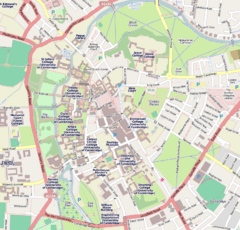Gonville and Caius College, Cambridge facts for kids
Quick facts for kids Gonville & Caius College |
|||||
|---|---|---|---|---|---|
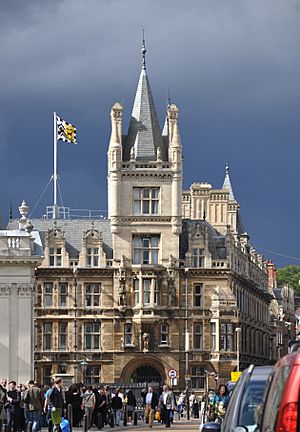
Gonville & Caius College from King's Parade
|
|||||
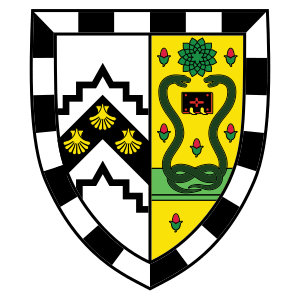
Arms of Gonville & Caius College
|
|||||
|
|
|||||
| University | Cambridge University | ||||
| Location | Trinity Street (map) | ||||
| Coordinates | 52°12′21″N 0°07′04″E / 52.2059°N 0.1179°E | ||||
| Abbreviation | CAI | ||||
| Founders |
|
||||
| Established | 1348, refounded 1557 | ||||
| Previous names |
|
||||
| Sister college | Brasenose College, Oxford | ||||
| Master | Pippa Rogerson | ||||
| Undergraduates | 550 | ||||
| Postgraduates | 280 | ||||
| Map | |||||
Gonville & Caius College (often referred to simply as Caius, pronounced “keys” or) is a constituent college of the University of Cambridge in Cambridge, England. Originally founded in 1348, it is the fourth-oldest of the thirty-one colleges at the University of Cambridge and one of the wealthiest. The college has been attended by many students who have gone on to significant accomplishment, including fifteen Nobel Prize winners, the second-most of any Oxbridge college (after Trinity College, Cambridge).
The college has long historical associations with medical teaching, especially due to its alumni physicians: John Caius (who gave the college the caduceus in its insignia) and William Harvey. Other famous alumni in the sciences include Francis Crick (joint discoverer, along with James Watson, of the structure of DNA), James Chadwick (discoverer of the neutron) and Howard Florey (developer of penicillin). Stephen Hawking, previously Cambridge's Lucasian Chair of Mathematics Emeritus, was a fellow of the college until his death in 2018. The college also maintains reputable academic programmes in many different disciplines, including law, economics, English literature and history. Other notable alumni include former Chancellor of the Exchequer and Father of the House of Commons, Kenneth Clarke, comedian and television presenter Jimmy Carr, John Venn, inventor of the Venn diagram and Alastair Campbell, former aide to Tony Blair.
Several streets in the city, such as Harvey Road, Glisson Road and Gresham Road, are named after alumni of the College. The college and its masters have been influential in the development of the university, founding other colleges like Trinity Hall and Darwin College and providing land on the Sidgwick Site, e.g. for the Squire Law Library.
Contents
Notable members
Nobel Prize laureates
- 1932 Charles Scott Sherrington – neurophysiologist (student and fellow).
- 1935 James Chadwick – physicist, discoverer of the neutron (student, fellow and master).
- 1945 Howard Florey – co-developer of penicillin (fellow).
- 1954 Max Born – physicist.
- 1962 Francis Crick – discovery of the structure of DNA (PhD student and honorary fellow).
-
1972 John Hicks – economist (fellow).
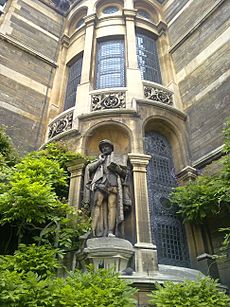 Statue of Stephen Perse, founder of the Perse School in Cambridge, set into the north-east corner of the Waterhouse Building
Statue of Stephen Perse, founder of the Perse School in Cambridge, set into the north-east corner of the Waterhouse Building - 1974 Antony Hewish – astronomer (student and fellow).
- 1976 Milton Friedman – economist (visiting fellow).
- 1977 Nevill Francis Mott – theoretical physicist (fellow and master).
- 1984 Richard Stone – economist.
- 2001 Joseph Stiglitz – economist (fellow).
- 2008 Roger Tsien – chemist (fellow).
- 2013 Michael Levitt – chemist (PhD student and research fellow).
- 2016 Michael Kosterlitz – physicist.
- 2019 Peter J. Ratcliffe – physician-scientist (student).
Notable alumni
Notable fellows and masters
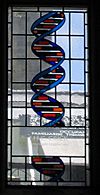
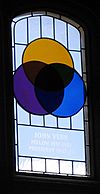
- Edward Hall Alderson – mathematician, classicist, lawyer and judge (student and fellow).
- T. C. Anand Kumar – reproductive biologist and the creator of the first scientifically documented test tube baby in India (fellow).
- Peter Bayley – Drapers Professor of French (fellow).
- Peter Thomas Bauer – economist (student and fellow).
- Charles Brink – classicist, Kennedy Professor of Latin (1954–74) (fellow).
- Alastair Campbell – Downing Street Press Secretary (student and fellow).
- Roger Carpenter – neurophysiologist (fellow).
- James Chadwick – Nobel Prize-winning physicist, discoverer of the neutron (student, fellow, and Master).
- John Colton – Lord Chancellor of Ireland and Archbishop of Armagh (first Master).
- Francis Crick – co-Nobel Prize winner for the co-discovery of the structure of DNA (PhD student and honorary fellow).
- David Daube – the twentieth century's preeminent scholar of ancient law (fellow).
- Alfred Doll-Steinberg (1933–2012) – Austrian-born British chemical engineer
- M. J. Farrell – economist (fellow).
- Alan Fersht – chemist and Fellow of the Royal Society (student, fellow, and Master).
- Thomas Fink, physicist and author (fellow).
- Ronald Fisher – statistician, evolutionary biologist, and geneticist (student, fellow, and President).
- Howard Florey – Nobel Prize-winning co-inventor of penicillin (fellow).
- James Fox – art historian and broadcaster (fellow).
- Milton Friedman – Nobel Prize-winning economist (visiting fellow).
- Francis Glisson – physician, and one of the founders of the Royal Society (fellow).
- John Hartstonge – Bishop of Derry (fellow).
- Stephen Hawking – theoretical physicist and former Lucasian Professor (fellow).
- Antony Hewish – Nobel Prize-winning astronomer (student and fellow).
- John Hicks – Nobel Prize-winning economist (fellow).
- Edmund Hickeringill – churchman (fellow)
- Robin Holloway – composer (fellow).
- Sarah Howe – poet (fellow).
- William Lubbock – divine.
- Stephen Mangan – actor
- Nevill Mott – Nobel Prize-winning theoretical physicist (fellow and Master).
- M. M. Pattison Muir – chemist (fellow).
- Joseph Needham – sinologist (student, fellow, and Master).
- Stephen Perse – founder of The Perse School in 1615.
- J. H. Prynne – poet (student and fellow).
- Jonathan Sacks – Chief Rabbi of British Commonwealth (fellow).
- Mohamed Suffian Mohamed Hashim – Chief Justice of Malaysia (student and fellow).
- John Seeley – Regius Professor of Modern History at Cambridge (fellow).
- D.R. Shackleton Bailey – classicist (student and fellow).
- Charles Sherrington – Nobel Prize-winning neurophysiologist (student and fellow).
- Quentin Skinner – Regius Professor of Modern History at Cambridge (student and fellow).
- Joseph Stiglitz – Nobel Prize-winning economist (fellow).
- John Venn – inventor of the Venn diagram and historian of the College (student, fellow, and President).
- Peter Tranchell – composer (fellow).
- William Wade – English academic lawyer (student and Master).
- Joachim Whaley – German and Dutch historian. Pilkington Teaching Prize, 2010.
- Charles Wood – composer (fellow).
- Edward Wright – mathematician and cartographer who first explained the mathematical basis for the Mercator projection (student and fellow).
- Eugenia Cheng – mathematician, author, concert pianist (student).
Notable organ scholars
- Heathcote Dicken Statham (1908–1911)
Burials
Images for kids
-
Cambridge University, Gonville & Caius College, from King's Parade
See also
 In Spanish: Gonville and Caius College para niños
In Spanish: Gonville and Caius College para niños


